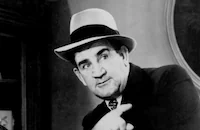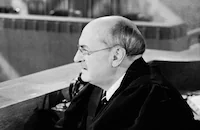Go Chase Yourself

Brief Synopsis
Cast & Crew
Edward F. Cline
Joe Penner
Lucille Ball
Richard Lane
June Travis
Fritz Feld
Film Details
Technical Specs

Synopsis
After years of buying raffle tickets, meek and dim-witted bank teller Wilbur P. Meeley finally wins a prize--a new recreational trailer. Although Wilbur is too poor to own a car, he nonetheless pulls the trailer to his home, where he is met with disdain by Carol, his ever-practical wife. That night, three bandits, Nails, Ice-Box and Frank, rob Wilbur's bank, aided by a tip that Wilbur unwittingly had given them earlier in the day. Pursued by police, the robbers drive to Wilbur's dead end street, where they spot Wilbur's trailer. Unaware that Wilbur is sleeping in it, the robbers hook the trailer to their car and take off in the guise of vacationers. The next morning, Wilbur wakes up and discovers that the trailer is camped alongside a deserted highway and that he is now the robbers' captive. Always the conscientious husband, Wilbur, who has become the police's primary robbery suspect, climbs a telephone pole and calls Carol to inform her of his general whereabouts. While Carol dashes to a train to find Wilbur before the police do, Wilbur meets debutante Judy Daniels, who is fleeing from her arranged marriage to Count Pierre Fontaine de Louis-Louis. After repairing Judy's car, Wilbur suggests to the robbers that they help the heiress, and the robbers, seeing a perfect opportunity for a kidnapping, agree. In the meantime, Carol meets the phony, wolfish Count Pierre on her train and, followed by the police, decides to use him as a decoy. Eventually, the police, Carol, Pierre, Judy and her family, and Wilbur and the robbers end up at the Daniels' estate. Carol helps Wilbur to escape with Judy and then is arrested with Pierre and thrown in jail. After Wilbur, who has delivered Judy to her kidnappers, mistakenly returns the suitcase with the bank robbery cash to the police, the location of the trailer is discovered when a roving radio broadcaster interviews Wilbur in the trailer. Chased by the police, the robbers, who have also taken Carol, Pierre and the jail warden prisoner, disconnect the trailer on a steep mountain road. Following a long and furious trip down the mountainside, the trailer finally lands in a bale of hay, and Wilbur is declared a hero by his bank boss and the police.

Director
Edward F. Cline
Cast
Joe Penner

Lucille Ball

Richard Lane

June Travis

Fritz Feld

Tom Kennedy

Granville Bates

Bradley Page

George Irving
Arthur Stone

Jack Carson
Frank M. Thomas
Edith Craig
Margaret Armstrong
Ted Oliver
George Shelley
Crew
Bert Granet
Feild M. Gray
Sascha Laurance
Jack Mackenzie
Desmond Marquette
Edward Melcher
Walter O'keefe
Van Nest Polglase
Hal Raynor
Renie
Robert Sisk
Richard Van Hessen
Vernon L. Walker
William W. Watson
Roy Webb
Paul Yawitz

Film Details
Technical Specs

Articles
Go Chase Yourself
Go Chase Yourself was a first for Penner too; it was the first time he received star billing. As the story goes, it was Penner who pushed for Lucille Ball to be cast in the film after hearing her on The Phil Baker Show on the radio. Penner, himself, was best known as a radio personality who rose to fame during the Depression; his famous trademark catchphrase was "Wanna buy a duck?"
Penner was born Josef Pinter in Hungary. He moved to New York with his parents as a child, where he would later get his comedic start on the vaudeville stages. Penner's act generally involved his carrying a prop on stage and asking the straight man if he wanted to buy it. Most nights it wasn't a raving success, until the day Penner hit on his money prop a wooden decoy duck. For some reason, buying a wooden duck was funny; audiences went wild. Penner was soon on the radio and a household name. He was one of the first stars to have a regular radio series broadcast from Los Angeles. The show also featured another rising star - Mel Blanc as the voice of Goo-Goo the duck.
In no time Penner made the leap to the movies. His introduction to Hollywood came in 1932's Here, Prince. The comedy short, which also featured Margaret Dumont, was also known under the alternate title, You Nasty Man, another of Penner's catchphrases. Penner's first feature came in 1934 with College Rhythm. He followed that with Collegiate (1936), another campus musical, that once again co-starred Jack Oakie, and featured another famous face, Betty Grable. Other highlights from Penner's movie career include Mr. Doodle Kicks Off (1938) with June Travis and Jack Carson and The Day the Bookies Wept (1939), again with Betty Grable. Penner's final film is probably his best known - The Boys from Syracuse (1940). Based on the Broadway musical, The Boys from Syracuse co-starred Allan Jones and Martha Raye and allowed Penner to stretch his comedic talent in a dual role. Sadly, Penner died of a heart attack in 1941. He was only 36-years old and still at the height of his popularity.
A few other familiar faces to watch out for in Go Chase Yourself are June Travis as Judy the debutant with car trouble; prolific character actor Granville Bates plays Hamilton Halliday (Bates may be best remembered as the judge from My Favorite Wife [1940]); and Jack Carson, in an early role, appears as a reporter.
Producer: Robert Sisk
Director: Edward F. Cline
Screenplay: Bert Granet, Sascha Laurence, Edward Melcher, Walter O'Keefe, William W. Watson, Paul Yawitz
Cinematography: Jack MacKenzie
Film Editing: Desmond Marquette
Art Direction: Van Nest Polglase
Music: Roy Webb, Hal Raynor
Cast: Joe Penner (Wilbur P. Meely), Lucille Ball (Carol Meely), Tom Kennedy (Icebox), Richard Lane (Nails), Bradley Page (Frank), June Travis (Judith Daniels).
BW-71m.
by Stephanie Thames

Go Chase Yourself
Quotes
Trivia
Notes
Joe Penner received star billing for the first time in Go Chase Yourself, and Lucille Ball enjoyed her first leading role in the film. According to modern sources, Penner pushed RKO to cast Ball after he heard her on The Phil Baker Show, a popular radio program on which Ball had just become a regular featured performer. The contributing writers listed above were taken from a February 1938 credit sheet from Screen Achievements Bulletin but were not included on March 1938 credit sheet, suggesting that they each contributed less than 10 percent to the final script. Motion Picture Herald's "In the Cutting Room" and Hollywood Reporter news items add Vicki Lester, Otto Fries and William Franey as cast members, but their participation in the final film has not been confirmed. "I'm from the City," the title of the film's song, was also the title of Penner's next movie. Modern sources add the following cast members: Jack Green (Officer), Philip Morris (Policeman), John Ince (John Weatherby), Lynton Brent (Photographer), Clayton Moore, Alan Bruce and William Corson (Reporters), Napoleon Whiting (Porter), Donald Kerr (Gas station attendant), Bobs Watson (Junior), Diana Gibson and Rita Oehmen (Diners), Billy Dooley (Linesman), Edward Hearn (Raffle seller) and Chester Clute (Excited man).














